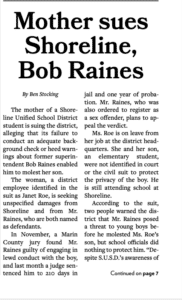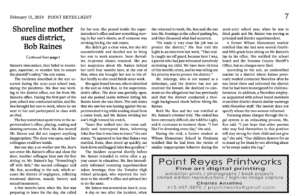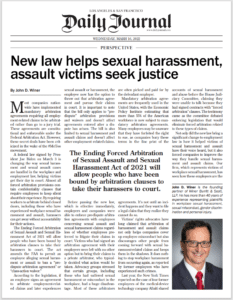While more than 4,000 people have filed lawsuits against Catholic institutions across the state since 2020, the overwhelming majority of those plaintiffs are decades older than Doe. On average, it can take survivors 40 years to come forward, according to victim advocates.
Doe is an exception. He credits his supportive family and a society increasingly willing to believe survivors for giving him the strength to come forward at such a young age. Now, he has a message he wants to share with the public.
“The house is still burning,” Doe said. “I shed a lot of light on the fact that these issues haven’t been resolved. Even if they have made reformative efforts, it’s BS.”
While Doe might just be 22, he’s unpacking more than a lifetime of experiences.
When Doe was 10 years old, Hector David Mendoza Vela became the pastor of St. John the Baptist in San Lorenzo. It’s the church where his family and many other immigrants in the area attended.
“I think everything started off innocently, considering that we share the same nationality,” Doe said. “He was almost like a beacon, you know, like a stake on the ground. Like, okay, we’re home.”
Doe was an altar boy at the time and says the priest became almost like family.
“He would ultimately sleep over at my house,” he said. “We would give him safe passage in our home. We even gave him a key. That’s how much my parents trusted him.”
Doe said Fr. Vela began spending the night at his family’s house nearly every other day. The priest often picked him up from school, and those car rides home were where Doe said he began noticing red flags.
“He’d put his hand on my lap,” said Doe, who was about 14 when the touching began. “When I started to get frustrated with it, I started to really dig my hand into my lap just to prevent him from moving his hand up even more.”
The touching followed Doe from those car rides into his home, he said, when the priest slept over at night.
“There were two instances where I woke up and he had his hand on my crotch region,” Doe said. “The second time around, that’s when I actually confronted him.”
Doe recalls telling the priest he had to leave his house immediately.
In a 2020 lawsuit filed against the Oakland diocese, Doe said he first disclosed the abuse to his therapist in 2019. The therapist, according to the lawsuit, recommended that Doe tell his parents about the abuse, which he did. As a mandated reporter, the therapist also called the police.
Alameda County sheriff’s deputies arrested Vela on 30 counts of suspected child abuse, all involving Doe over an 18 month period that began in 2016.
Oakland Bishop Michael Barber placed Vela on leave and the priest later pleaded no contest to five counts of lewd or lascivious acts on a child aged 14 or 15. He served nearly five years in prison, but that didn’t heal Doe’s trauma.
“There was an instance where I tried to commit suicide,” Doe said. “I just felt like I didn’t want to hold that weight.”
Vela’s arrest even impacted his family, who kept attending church.
“Not only have my parents been harassed during mass, they have been called out, like, ‘you’re disgraceful,’” Doe said.
A year after Vela’s arrest, Doe joined the thousands of Californians across the state suing the Catholic church for child sexual abuse. Many dioceses have filed for bankruptcy, including Oakland and San Francisco, citing the wave of lawsuits.
Erika Scott represents Doe and more than 200 other clergy abuse survivors with active lawsuits in California. But Doe’s case stands out among the rest, she said.
“He is significantly younger by decades,” Scott said. “This is so different from the experiences of the majority of my clients.”
Scott said Doe’s story shows the church still has a long way to go in addressing the abuse crisis.
“I think that there’s a perception that a couple of decades ago this problem went away, that the church fixed it,” Scott said. “It was eye opening to me to know that this was still going on.”
In December, Oakland Bishop Michael Barber attended a bankruptcy hearing for the diocese where a judge allowed eight survivors, including John Doe, to share their stories with the court.
“As I speak here today, I hope it’s clear and evident that I am no longer the scared little boy pleading for his nightmare to end, but a man who’s given every ounce of blood, sweat, and tears to stand here unshaken,” Doe said in front of Bishop Barber and the bankruptcy court judge.
“If you haven’t noticed by now, I am one of the youngest faces out of all the speakers here today,” Doe went on to say. “I am living proof that despite whatever ‘reformative’ efforts the church has made, child sexual abuse in the Roman Catholic Church still exists. You cannot deem yourself absolved of all sins if you cannot take full accountability for all of your actions.”
Inside the courtroom, Bishop Barber read a statement apologizing to victims.
“I want to convey a sincere, complete, and unconditional apology,” he said. “I am truly sorry.”
But Doe said the apology fell flat.
“It just felt disingenuous,” he said. “It was just like a blank statement.”
Doe’s civil case remains on hold in state court as the bankruptcy process plays out. Scott is among the attorneys, survivors and advocates who question the need for dioceses like Oakland and San Francisco to seek bankruptcy protection.
“We don’t get to do discovery, we don’t get to find out what happened in these individual cases,” Scott said. “We don’t get to find out who knew what and when.”
Despite having to relive his trauma, Doe said he’s glad he came forward.
“There’s that weight off my chest,” he said. “I’m ready to fight.”








